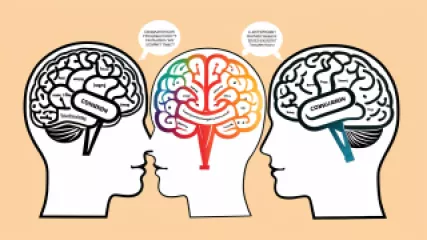Exploring Common Cognitive Distortion Types: An Expert Interview
Exploring Common Cognitive Distortion Types: An Expert Interview
Welcome to our expert interview series, where we delve deep into various topics and hear insights from professionals in the field. In this edition, we have the privilege of speaking with Dr. Sarah Thompson, a renowned psychologist specializing in cognitive distortions. Dr. Thompson has extensive experience in helping individuals recognize and overcome these distortions for improved mental well-being. Let's dive into our conversation and explore common cognitive distortion types.
Understanding Cognitive Distortions
Cognitive distortions are patterns of thinking that can negatively impact our perceptions of ourselves, others, and the world around us. These distorted thoughts often lead to negative emotions and behaviors, affecting our overall mental health. By exploring and understanding these distortion types, we can work towards challenging and changing them to lead more balanced and fulfilling lives.
The Role of Cognitive Distortions in Mental Health
I asked Dr. Thompson about the significance of cognitive distortions in mental health, and she emphasized their pervasive influence. She explained, "Cognitive distortions act as filters through which we interpret our experiences. When these filters are distorted, they can create a distorted reality, leading to emotional distress and maladaptive behaviors."
Dr. Thompson further elaborated on how cognitive distortions often contribute to anxiety disorders, depression, and other mental health conditions. "For example, individuals with anxiety may catastrophize situations, constantly imagining the worst-case scenario. This can intensify their anxiety and limit their ability to function optimally."
Identifying Common Cognitive Distortion Types
We then delved into some of the most common cognitive distortion types that people experience. Dr. Thompson highlighted several key distortions and provided valuable insights into each one:
1. All-or-Nothing Thinking
Dr. Thompson explained, "All-or-nothing thinking is a distortion where individuals perceive situations in extremes, without acknowledging shades of gray. They tend to see things as either perfect or a complete failure, with no middle ground."
She emphasized the importance of challenging this type of thinking and striving for a more balanced perspective. "Recognizing that there are often multiple possibilities between two extremes can help individuals develop a more realistic and constructive mindset," she advised.
2. Overgeneralization
"Overgeneralization is when we draw broad conclusions based on limited evidence," Dr. Thompson shared. "For example, if a person fails at one task, they may conclude that they are a failure in all aspects of their life."
She stressed the need to examine the evidence and consider alternative explanations. "By challenging overgeneralization, individuals can start recognizing their strengths and achievements, rather than getting trapped in negative self-perceptions," Dr. Thompson explained.
3. Mind Reading
Dr. Thompson discussed the cognitive distortion known as mind reading. "Mind reading is when we assume we know what others are thinking, even without any concrete evidence. We often attribute negative thoughts or intentions to others, leading to misunderstandings and strained relationships."
To overcome this distortion, she recommended open communication and seeking clarification. "Instead of assuming, ask questions and express your thoughts and concerns. This can prevent unnecessary conflict and foster healthier connections with others," Dr. Thompson advised.
4. Emotional Reasoning
"Emotional reasoning occurs when we believe our emotions reflect reality, regardless of the actual evidence," Dr. Thompson explained. "For instance, someone feeling anxious about an upcoming event may assume that something terrible will happen, solely based on their anxious feelings."
She emphasized the importance of evaluating the evidence objectively. "By challenging emotional reasoning, individuals can separate their emotions from the actual facts, leading to more rational and balanced thinking," she suggested.
5. Labeling
Lastly, Dr. Thompson discussed the distortion of labeling. "Labeling involves assigning global negative labels to oneself or others based on specific behaviors or mistakes," she said. "This type of thinking overlooks the complexity and potential for growth in individuals."
She encouraged individuals to practice self-compassion and view themselves and others holistically. "Shifting from labeling to understanding that people are multifaceted can foster empathy and promote personal growth," Dr. Thompson advised.
Challenging Cognitive Distortions
Dr. Thompson emphasized that recognizing and challenging cognitive distortions is a crucial step towards overcoming them. She provided some strategies to help individuals challenge these distortions:
- Reality testing: Actively examine the evidence for and against your distorted thoughts. Look for alternative explanations and consider more balanced perspectives.
- Keeping a thought journal: Write down your negative thoughts and analyze them objectively. Identify patterns and question the validity of these thoughts.
- Seeking support: Share your thoughts and concerns with trusted individuals, such as friends, family, or a therapist. They can provide valuable insights and help you challenge your distortions.
- Cognitive-behavioral therapy (CBT): Consider working with a therapist trained in CBT, a widely used therapeutic approach to address cognitive distortions and develop healthier thinking patterns.
- Practice self-compassion: Treat yourself with kindness and understanding. Remember that everyone makes mistakes, and personal growth is a continuous process.
Conclusion
Cognitive distortions can significantly impact our mental well-being, leading to negative emotions and behaviors. By identifying and challenging these distortions, we can begin to reshape our thinking patterns and cultivate healthier perspectives. Remember, recognizing and addressing cognitive distortions is a journey, but one that can ultimately lead to greater self-awareness and improved mental health.
We would like to extend our gratitude to Dr. Sarah Thompson for sharing her expertise and insights on cognitive distortion types. We hope this interview has provided you with valuable information and tools to navigate and overcome cognitive distortions in your own life.






